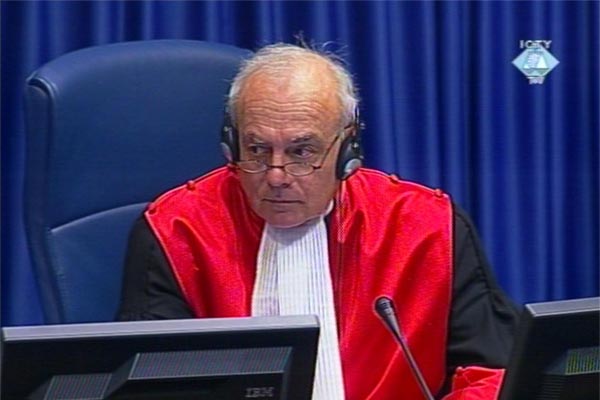Home
PUBLIC HAS NO ACCESS TO PUBLIC DOCUMENTS
The prosecution asks for permission to file an appeal against the Trial Chamber’s decision to keep the public documents not available to the public until the judgment is delivered in the case of Vojislav Seselj
 Jean-Claude Antonetti, presiding judge in the Seselj trial
Jean-Claude Antonetti, presiding judge in the Seselj trial On 15 September 2008 the ICTY Registry requested instructions from the Trial Chamber hearing the case of Vojislav Seselj. The Registry asked for advice: how should it proceed when the public showed interest in public documents discussed at this trial. The enquiry followed after a request for the transcripts of certain intercepted conversations between Radovan Karadzic and other individuals, broadcast in court at the trial of Vojislav Seselj on 15 July 2008.
The Trial Chamber with French judge Antonetti presiding ruled on 18 September 2008 that those documents – despite the fact that they were shown before the court in open session – could not be made available to the public until the Chamber has delivered its judgment in this case. As the Chamber explained, “tendering exhibits into evidence is only a preliminary phase, a stage in which the indicia of relevance and probative value of the exhibits are deemed sufficient while their ultimate weight will not be evaluated until the final deliberations, in light of the case as a whole, with the Chamber reserving the possibility, at that stage, of considering their admission”.
The prosecution asked today for a permission to file an appeal against this decision, because it raises an issue that might ‘significantly affect the conduct of the proceedings’. Referring to the Trial Chamber’s conclusion in the same decision, that ‘the right to a public trial is not intended to apply solely to the accused, but also covers the international community’s right to be informed”, the prosecution noted that the ‘right of the public to inform itself as to the proceedings and evidence simply cannot be ensured by granting access to exhibits tendered into evidence at the conclusion of the trial’. The prosecution warns that “transparency must be an on going process, lest suspicions cast a penumbral shadow on the fairness of the trial as a whole”.
As the prosecution sees it, this issue is particularly important in the case of Vojislav Seselj since he ‘regularly publishes information dealt with in court with the view to demonstrating that the trial is not fair’. Considering that factor, the prosecution goes on in its motion, ‘the lack of access to public exhibits during the trial has a clear effect on the fairness of the trial’.
It is ironic that the whole affair about the public documents unavailable to the public started with a request for access to transcripts of intercepted telephone conversations from the so-called Milosevic collection. Those transcripts have been repeatedly shown in open session at various trials and are available to the general public – both audio tapes and transcripts – on the Internet, at http://www.domovina.net/tribunal/page_006.php
